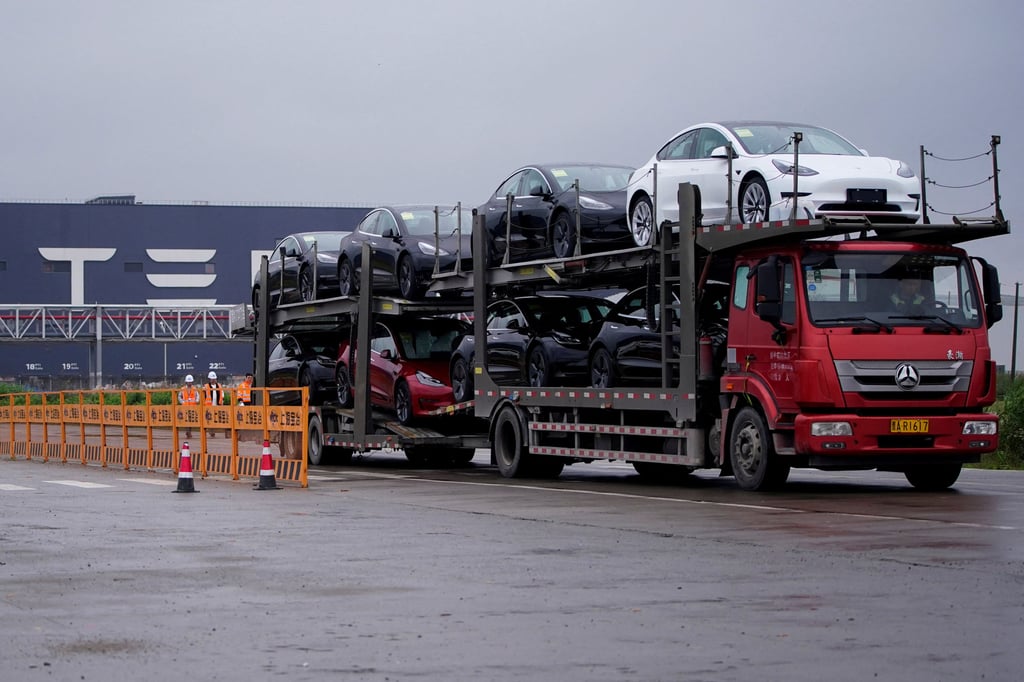Tesla reaps benefits as EU cuts planned tariffs on Chinese-made electric vehicles
It was not included in the sample of three Chinese companies on which the weighted average tariff was based.
The new rates still mark a hefty rise in tariff rates for most companies making EVs in China. The previous import duty stood at 10 per cent across the board.
EVs made by BYD, the world’s biggest-selling battery electric vehicle company, will face a tariff rate of 17 per cent rather than 17.4 per cent. For Geely-made EVs, the rate dropped from 20 per cent to 19.3 per cent.
Another 17 companies deemed to have cooperated with the EU’s probe will face a slightly higher rate of 21.3 per cent, up from 20.8 per cent, after the commission found errors in its initial calculations. Non-cooperating companies will pay the 36.3 per cent top rate.
The duties are the results of an anti-subsidy investigation that finished in June. It investigated more than 100 firms and found market-distorting subsidies across the entire EV supply chain in China.

Provisional tariffs were imposed last month, but the commission announced on Tuesday that it would not collect those duties before the more permanent rates are written into EU law. This must happen by October 30 at the latest and will take effect a day later.
The commission has also decided not to retroactively collect backdated tariffs, a move floated earlier this year.
It plans to offer reduced tariffs of 21.3 per cent – down from 37.4 per cent – to Chinese firms that launched EV joint ventures with EU companies such as BMW and Volkswagen since the initial probe was launched in September 2023
One of the vehicles receiving the lower duty will be the Cupra Tavascan, made by a joint venture between Volkswagen and Chinese company JAC Group.
The reduction in duties came after consultations with carmakers. In some cases, BYD, Geely and SAIC have been able to prove that certain things the commission had thought were subsidies were intercompany transactions.
In other cases there were technical mistakes found in the commission’s calculations, leading to minor tweaks in the tariff rate.
The definitive proposal will be voted on by the EU’s 27 member states in October, before being written into law for five years.
The proposal can only be reversed if a majority of capitals vote against the duties. In an indicative vote taken in July, only four countries voted against them.
The proposed tariff rates could still change, and car makers now have a period of 10 days to submit their views after being told of the plans on Tuesday.
The information has also been transmitted to EU member states and the Chinese government.
The European Commission has been locked in technical talks with Beijing and says it is still open to a deal.
“The EU is open to reaching an alternative solution on the position of the duties that would be effective and WTO [World Trade Organization] compatible. It would align with WTO rules and provide a solution to the problems we find,” a senior EU official said.
In other words: the ball is in Beijing’s court to come up with something that would have the same desired effect as the duties.
Behind the scenes, however, expectations of a deal are low, with EU officials pointing to China’s failure to even acknowledge there is a problem with subsidies.
China has disputed the findings of the EU’s probe, which has become a persistent drag on relations.
Last week the Chinese government lodged a complaint at the WTO, requesting consultations with the EU in what is a standard precursor to a dispute settlement case.
The EU will accept the request for consultations, sources said, and it is expected that the previous talks on EVs will continue in this stream in Geneva.
It has also launched what are broadly seen as retaliatory probes against EU-made brandy and pork products.
.jpg?itok=Qexy_wA0)